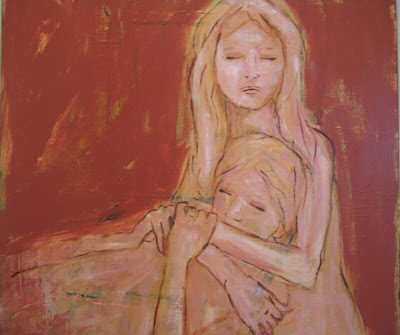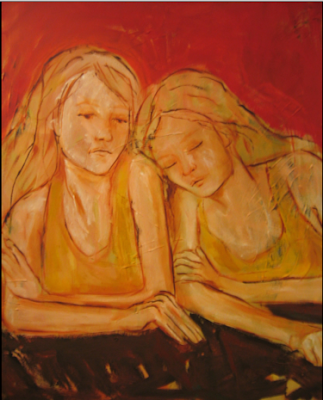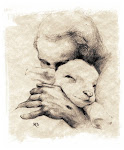
Thursday's Therapy
Tend and Befriend:
How Women Grieve
I have noticed that many of us this week in the grief groups in which I am involved have been seemingly "stuck" in unresolvable issues with close friends and even family members.
I haven't quite figured out yet why our secondary wounds cause us so much grief since our loss of our child far outweighs any other kind of loss or grief, but somehow they do!
At the moment, the greatest guess I have is that social support is such a basic element in the repertoire of our tools for healing or at least for soothing our deep grief.
So when you notice that the exact opposite is too often coming your way,
- social meanness,
- social harassment,
- social callousness,
- social expectations of the impossible for your moving on from your grief,
- a social piety of sorts for the conventional "wisdom" of how grief should be done (seems right to them, but is so wrong for us Child-Loss grievers),
- social discrimination that we pick up on of people judging us and deciding we are "belaboring" our grief instead of moving on from it as they think should be done, etc.,
you begin to catch a glimpse at how dismal are our options for social support in this deep, deep grief that no-one-but-another-child-loss-griever seems to understand!
But when the social milieu is loving and supportive of us, it has amazing qualities for our potential healing. And even though it is often difficult to be a part of grief groups in that I cry many tears for others' pain, the love and understanding that is there is remarkably comforting. Even my tears for others somehow seems to help my own grief for my child to be released!
Notice the findings of the following excerpts from a summary of a recent UCLA study done on how women deal with stress as opposed to men!

A landmark UCLA study suggests friendships between women are special. They shape who we are and who we are yet to be. They soothe our tumultuous inner world, fill the emotional gaps in our marriage, and help us remember who we really are. By the way, they may do even more.
Scientists now suspect that hanging out with our friends can actually counteract the kind of stomach-quivering stress most of us experience on a daily basis. A landmark UCLA study suggests that women respond to stress with a cascade of brain chemicals that cause us to make and maintain friendships with other women. It's a stunning find that has turned five decades of stress research---most of it on men---upside down. Until this study was published, scientists generally believed that when people experience stress, they trigger a hormonal cascade that revs the body to either stand and fight or flee as fast as possible, explains Laura Cousin Klein, Ph.D., now an Assistant Professor of Biobehavioral Health at Penn State University and one of the study's authors. It's an ancient survival mechanism left over from the time we were chased across the planet by saber-toothed tigers.
Now the researchers suspect that women have a larger behavioral repertoire than just fight or flight; In fact, says Dr. Klein, it seems that when the hormone oxytocin is released as part of the stress responses in a woman, it buffers the fight or flight response and encourages her to tend children and gather with other women instead. When she actually engages in this tending or befriending, studies suggest that more oxytocin is released, which further counters stress and produces a calming effect. This calming response does not occur in men, says Dr. Klein, because testosterone---which men produce in high levels when they're under stress---seems to reduce the effects of oxytocin. Estrogen, she adds, seems to enhance it….
It may take some time for new studies to reveal all the ways that oxytocin encourages us to care for children and hang out with other women, but the "tend and befriend" notion developed by Drs. Klein and Taylor may explain why women consistently outlive men. Study after study has found that social ties reduce our risk of disease by lowering blood pressure, heart rate, and cholesterol. There's no doubt, says Dr. Klein, that friends are helping us live longer.
In one study, for example, researchers found that people who had no friends increased their risk of death over a 6-month period. In another study, those who had the most friends over a 9-year period cut their risk of death by more than 60%.
Friends are also helping us live better. The famed Nurses' Health Study from Harvard Medical School found that the more friends women had, the less likely they were to develop physical impairments as they aged, and the more likely they were to be leading a joyful life. In fact, the results were so significant, the researchers concluded, that not having close friends or confidants was as detrimental to your health as smoking or carrying extra weight.
And that's not all. When the researchers looked at how well the women functioned after the death of their spouse, they found that even in the face of this biggest stressor of all (Huh? No, not the biggest! Child-Loss has got to be the BIGGEST stressor of all!) those women who had a close friend and confidante were more likely to survive the experience without any new physical impairments or permanent loss of vitality. Those without friends were not always so fortunate. Yet if friends counter the stress that seems to swallow up so much of our life these days, if they keep us healthy and even add years to our life, why is it so hard to find time to be with them? That's a question that also troubles researcher Ruthellen Josselson, Ph.D., co-author of Best Friends: The Pleasures and Perils of Girls' and Women's Friendships (Three Rivers Press, 1998). The following paragraph is, in my opinion, very, very true and something all women should be aware of and NOT put our female friends on the back burners.
…That's really a mistake because women are such a source of strength to each other. We nurture one another. And we need to have unpressured space in which we can do the special kind of talk that women do when they're with other women. It's a very healing experience.
~From "UCLA Study on Friendship Among Women: An alternative to fight or flight as summarized by Gale Berkowitz, 2002
~Comment, mine

Taylor, S. E., Klein, L.C., Lewis, B. P., Gruenewald, T. L., Gurung, R. A. R., & Updegraff, J. A. Behaviorial Responses to Stress: Tend and Befriend, Not Fight or Flight" Psychol Rev, 107(3):41-429. (Full text of article in PDF format)
Geary DC, Flinn MV. Sex differences in behavioral and hormonal response to social threat: commentary on Taylor et al. Psychol Rev 2002 Oct;109(4):745-50; discussion 751-3
Cousino Klein L, Corwin EJ. Seeing the unexpected: how sex differences in stress responses may provide a new perspective on the manifestation of psychiatric disorders. Curr Psychiatry Rep. 2002 Dec;4(6):441-8.


Paintings ~by Megan Kingery, artist, from her gallery - http://megankingery.homestead.com/gallery2.html
Study Article: UCLA Researchers Identify Key Biobehavioral Pattern Used By Women To Manage Stress (Science Daily (May 22, 2000)
Article cited: UCLA Study on Friendship Among Women: An alternative to fight or flight 2002, Gale Berkowitz










































No comments:
Post a Comment